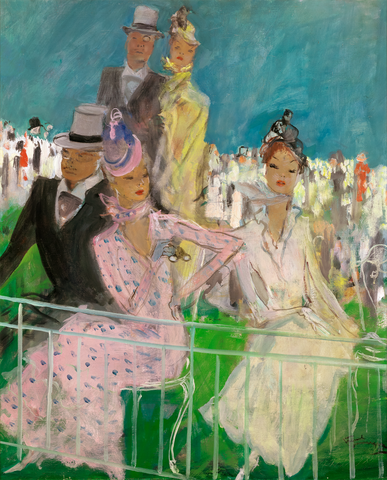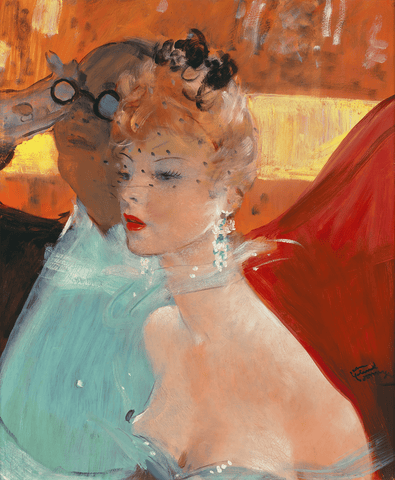Artists & Artisans
Domergue, Jean Gabriel
Born in Bordeaux in 1889, Domergue studied at the École Nationale Supérieure des Beaux-Arts. He was only 17 years old when he exhibited at the Salon des Artistes Français for the first time, winning the Prix du Rome in 1911 and a gold medal in 1920. Today, the French painter’s art is highly sought after in fine art circles and often features prominently in auction catalogs.
As with many of his contemporaries, Domergue’s burgeoning career was interrupted by World War I. While enlisted as a stretcher-carrier, Domergue did not halt his creative pursuits; he created drawings depicting the German atrocities which he ultimately exhibited in May 1916. This exhibition opened with the following quote, “The simplest sketch tells me a great deal more than a long report.” Following this exhibition, Jean Gabriel Domergue was condemned to death by the Germans. This warrant lasted throughout WWII and Domergue was forced to flee Paris for Algeria for the remainder of the war.
While landscapes dominated his early oeuvre, from the 1920s onward he changed his focus to what would become his trademark subject, la belle Parisienne (the pretty, modern Parisian woman). Domergue's artworks reflect the newfound sense of joie de vivre that permeated post-WWI Paris. Its impact could be felt in all the creative arts: from painting and fashion to music and dance. A subculture of jazz and jazz-influenced dance music, popularized by entertainers such as American Josephine Baker, quickly embedded itself into the Parisian scene and the organic asymmetry of the Art Nouveau gradually give way to the sleek sophistication of Art Deco. His portrait paintings of elegant women became iconic, and his work continues to influence contemporary art.
Domergue's women exude self-confidence and awareness, culminating in a perfect blend of prowess and elegance unique to his paintings. As a titan of the fashion industry, he prolifically created posters for catalogs, fashion ads and galas. His artwork was admired throughout the world and helped establish Parisian fashion as the epitome of elegance. In many ways, the French painter single-handedly created a new form of 20th-century feminine advertisement. Later replicated throughout the fashion industry, Domergue depicted women as slender and swanlike with nonchalant faces whose wide eyes look upon the world with intelligence and desire.
Domergue enjoyed a tremendously successful career and in many ways epitomized Parisian prestige and elegance. From 1955 until 1962 he was the curator of the Musée Jacquemart-André, organizing exhibitions of the works of van Gogh, Toulouse-Lautrec and Goya, among others. In addition, he also designed numerous dresses, hats, and accessories for famous couturiers, such as Paul Poiret and Henry Marque. Domergue was appointed a Chevalier of the Légion d’Honneur and also served as a Fellow of the Academy of Fine Arts.
Today, his works can be found in the permanent collections of prestigious museums around the world, including The Metropolitan Museum of Art in New York, the Musée d’Art Moderne de la Ville de Paris, the National Gallery of Art in Washington, D.C., and the Royal Collection in London. The French artist’s original works are highly prized in the fine art market, commanding high demand from art collectors across the world. M.S. Rau proudly carries a curated selection of original Jean Gabriel Domergue paintings for sale. Contact us today for more information.
Trouble with Germany
Career
Legacy
Artists & Artisans
Domergue, Jean Gabriel
Born in Bordeaux in 1889, Domergue studied at the École Nationale Supérieure des Beaux-Arts. He was only 17 years old when he exhibited at the Salon des Artistes Français for the first time, winning the Prix du Rome in 1911 and a gold medal in 1920. Today, the French painter’s art is highly sought after in fine art circles and often features prominently in auction catalogs.
As with many of his contemporaries, Domergue’s burgeoning career was interrupted by World War I. While enlisted as a stretcher-carrier, Domergue did not halt his creative pursuits; he created drawings depicting the German atrocities which he ultimately exhibited in May 1916. This exhibition opened with the following quote, “The simplest sketch tells me a great deal more than a long report.” Following this exhibition, Jean Gabriel Domergue was condemned to death by the Germans. This warrant lasted throughout WWII and Domergue was forced to flee Paris for Algeria for the remainder of the war.
While landscapes dominated his early oeuvre, from the 1920s onward he changed his focus to what would become his trademark subject, la belle Parisienne (the pretty, modern Parisian woman). Domergue's artworks reflect the newfound sense of joie de vivre that permeated post-WWI Paris. Its impact could be felt in all the creative arts: from painting and fashion to music and dance. A subculture of jazz and jazz-influenced dance music, popularized by entertainers such as American Josephine Baker, quickly embedded itself into the Parisian scene and the organic asymmetry of the Art Nouveau gradually give way to the sleek sophistication of Art Deco. His portrait paintings of elegant women became iconic, and his work continues to influence contemporary art.
Domergue's women exude self-confidence and awareness, culminating in a perfect blend of prowess and elegance unique to his paintings. As a titan of the fashion industry, he prolifically created posters for catalogs, fashion ads and galas. His artwork was admired throughout the world and helped establish Parisian fashion as the epitome of elegance. In many ways, the French painter single-handedly created a new form of 20th-century feminine advertisement. Later replicated throughout the fashion industry, Domergue depicted women as slender and swanlike with nonchalant faces whose wide eyes look upon the world with intelligence and desire.
Domergue enjoyed a tremendously successful career and in many ways epitomized Parisian prestige and elegance. From 1955 until 1962 he was the curator of the Musée Jacquemart-André, organizing exhibitions of the works of van Gogh, Toulouse-Lautrec and Goya, among others. In addition, he also designed numerous dresses, hats, and accessories for famous couturiers, such as Paul Poiret and Henry Marque. Domergue was appointed a Chevalier of the Légion d’Honneur and also served as a Fellow of the Academy of Fine Arts.
Today, his works can be found in the permanent collections of prestigious museums around the world, including The Metropolitan Museum of Art in New York, the Musée d’Art Moderne de la Ville de Paris, the National Gallery of Art in Washington, D.C., and the Royal Collection in London. The French artist’s original works are highly prized in the fine art market, commanding high demand from art collectors across the world. M.S. Rau proudly carries a curated selection of original Jean Gabriel Domergue paintings for sale. Contact us today for more information.






